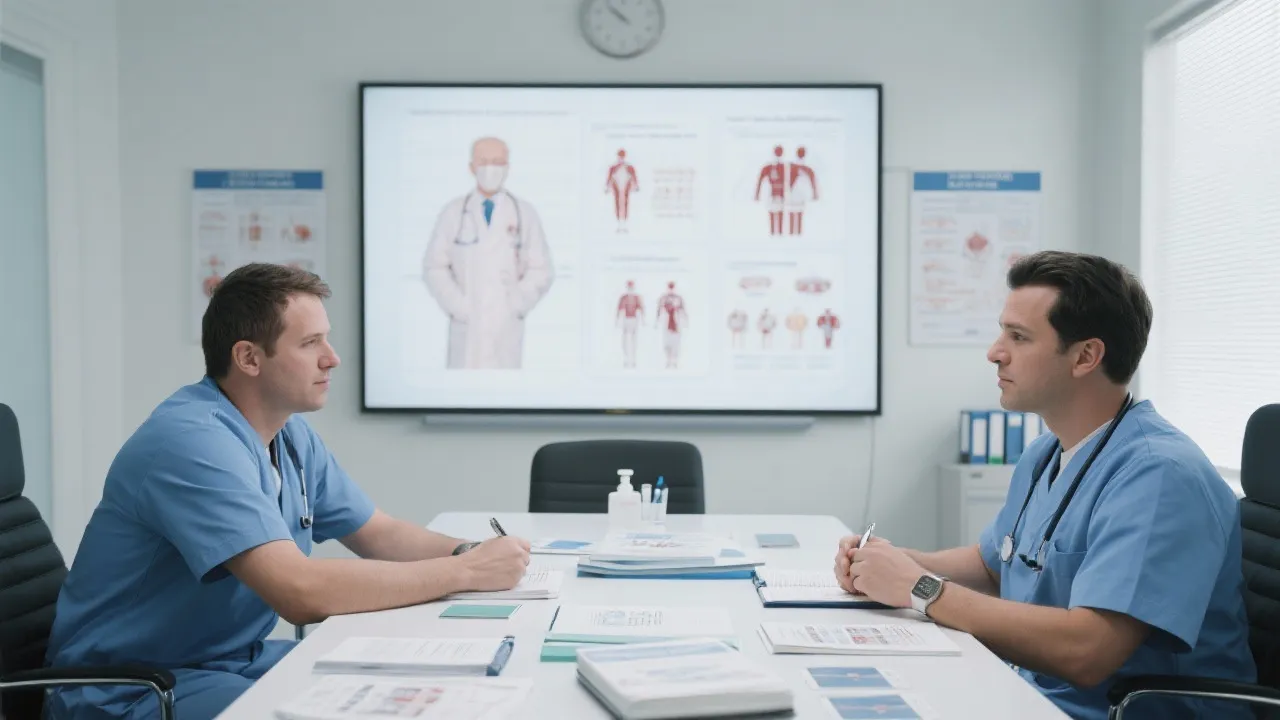Understanding the LPN Certificate Pathway
Delving into the LPN certificate, this guide explores its essentials for launching a career in nursing. Licensed Practical Nurse (LPN) certificates are foundational qualifications for those pursuing nursing careers. Such certifications enable individuals to deliver basic care under the supervision of doctors and registered nurses, providing a practical and focused training pathway into the healthcare field.

The Significance of an LPN Certificate
For many aspiring nurses, the Licensed Practical Nurse (LPN) certificate is a tangible step towards a rewarding career in healthcare. This certification serves as a stepping stone that meets the rising demand for healthcare professionals, especially in environments where efficient, compassionate care is paramount. It equips candidates with fundamental nursing skills and knowledge, positioning them well for entry-level roles in hospitals, clinics, and care facilities.
The significance of the LPN certificate extends beyond mere qualification; it acts as a critical gateway into the expansive world of nursing. The healthcare industry continues to evolve, with an increasing emphasis on patient-centered care and quality service delivery. As a result, LPNs play a vital role in bridging the gap between patients and more advanced healthcare providers. They often become the first point of contact in patient care, making their role indispensable in various clinical settings.
Embarking on the Journey to an LPN Certificate
Choosing to obtain an LPN certificate requires a clear understanding of the prerequisites, including educational background, commitment, and career aspirations. Typically, candidates need a high school diploma or equivalent GED. Programs span approximately 12 months but can vary slightly between institutions. These programs blend rigorous coursework in subjects like anatomy, pharmacology, and nursing ethics with hands-on clinical experience to ensure competencies in patient care.
Additionally, selecting the right program is crucial. Prospective students should research and consider various aspects such as accreditation, faculty qualifications, program reputation, and job placement rates. Connecting with current students or alumni can also provide insight into the program's effectiveness and the support offered to students. Furthermore, applicants must often undergo background checks, drug screenings, and immunization requirements to ensure they meet health and safety standards before commencing clinical placements.
Core Components of LPN Training
Very programs are comprehensive, covering extensive ground in patient care. Coursework usually includes the following components:
- Anatomy and Physiology: A fundamental understanding of the human body's structure and function is crucial for effective healthcare delivery. Students learn how various systems interact and how they can impact overall health, which is vital for providing appropriate care.
- Pharmacology: This involves learning about different medications, their effects, and the top practices for administering them safely. Understanding dosage calculations and potential side effects is essential, as LPNs are often responsible for administering medications and monitoring their effects on patients.
- Nursing Fundamentals: Practical skills in hygiene, patient monitoring, and basic medical procedures are taught to handle everyday nursing responsibilities efficiently. Mastery of these fundamentals lays the groundwork for further clinical practice.
- Nutrition: Understanding dietary requirements is essential for comprehensive patient care, particularly in supporting recovery and health maintenance. LPNs often assess patient diets and collaborate with dietitians to ensure nutritional needs are met.
- Clinical Practice: One of the most vital aspects of LPN training is hands-on clinical experience. Students work in real-world settings under the supervision of registered nurses or physicians, allowing them to apply theoretical knowledge to practice and develop vital clinical skills.
- Patient Care and Communication: Effective communication with patients, families, and healthcare teams is crucial. LPN programs emphasize the importance of building trust and rapport with patients, which directly influences care outcomes.
Completing these core components not only prepares LPNs for their responsibilities but also fosters a lifelong commitment to learning and professional development. Many LPN programs now integrate technology into their curriculum, providing students with exposure to electronic health records and telehealth systems, which have become increasingly relevant in today’s healthcare landscape.
The Value Proposition of LPN Programs
For those contemplating a career in nursing, the LPN certificate offers a rapid yet comprehensive training route. It opens up numerous career opportunities, providing a solid foundation for further advancement into roles such as a Registered Nurse (RN) or specializing in certain areas of nursing. Moreover, as healthcare needs continue to grow, LPNs are increasingly vital, ensuring basic and essential care is delivered effectively and compassionately.
The LPN designation is often perceived as one of the most accessible pathways into nursing. Given the current nursing shortage, many healthcare employers actively recruit LPNs, resulting in favorable job prospects upon graduation. The skills learned during LPN training translate well into various healthcare environments, allowing graduates to step into roles in hospitals, nursing homes, rehabilitation centers, and private practices. Beyond immediate employment, LPNs also benefit from ongoing professional development opportunities, with many institutions facilitating continued education and workshops to enhance skills and knowledge.
Additionally, for those who choose to further their education and transition to Registered Nursing, many LPN programs offer bridge courses to ease this transition. These pathways are essential for individuals seeking to advance their careers and become more competitive in the job market.
Comparison Table: LPN Certificate Programs
| Program Aspect | Description |
|---|---|
| Duration | Approximately 12 months, varies by institution. |
| Prerequisites | High school diploma or GED equivalent. |
| Core Topics | Anatomy, Pharmacology, Nursing Fundamentals, Nutrition, Clinical Practice. |
| Career Prospects | Entry-level positions in hospitals, clinics, and residential care facilities with potential for advancement. |
FAQs
Q: What is the average salary for an LPN?
A: Salaries vary widely depending on location and experience, but LPNs typically earn a competitive wage that increases with experience and additional qualifications. According to the Bureau of Labor Statistics, as of 2020, the median annual wage for LPNs in the United States was approximately $48,500.
Q: Can LPNs further their education?
A: Yes, many LPNs choose to pursue further education to become RNs or specialize in a specific nursing field, providing more career advancement opportunities. Several institutions offer bridge programs specifically designed for LPNs to transition into RN roles, enabling them to build on their existing knowledge and skills.
Q: Are LPN programs available online?
A: While theoretical aspects can often be covered online, practical skills require in-person attendance to ensure that competencies are developed through hands-on experience. Some hybrid programs may offer a blend of both, allowing students some flexibility while ensuring they meet clinical training requirements.
Q: How do LPN qualifications differ globally?
A: Requirements for LPNs can vary by country, so it's essential to check local regulations and standards if you're considering international work. Some countries may have different titles for similar roles, such as Enrolled Nurses or Vocational Nurses, and the regulatory bodies may set distinct educational and competency benchmarks.
Q: What qualities make a successful LPN?
A: Successful LPNs typically exhibit strong communication skills, empathy, attention to detail, and resilience under pressure. The ability to work effectively in a team and adapt to changing situations is also crucial, as healthcare environments can be unpredictable and fast-paced.
Envisioning the LPN Career Pathway
The pathway to becoming an LPN is as fulfilling as it is challenging, offering a stable and rewarding career within the healthcare sector. With the foundational skills acquired during training, LPNs can pursue various roles, adapt to different environments, and potentially specialize in areas of personal interest. Thus, the LPN certificate remains an essential credential for those eager to embark on a dynamic healthcare career.
As they accumulate experience, LPNs often find themselves taking on more responsibilities, including management tasks such as supervising nursing aides and contributing to care planning. Those interested in specialized areas, such as pediatrics, geriatrics, or mental health, can seek additional certifications that enhance their qualifications and marketability in nursing.
Moreover, the healthcare landscape is continually changing, presenting LPNs with opportunities to engage in further education tailored to emerging healthcare trends. Programs focusing on telehealth, chronic disease management, and geriatric care allow LPNs to enhance their knowledge base and skill set to meet evolving patient needs effectively.
Ultimately, embarking on the journey to obtaining an LPN certificate is not merely about fulfilling a professional requirement; it also embodies a commitment to making a positive impact on the lives of patients and the broader community. LPNs contribute invaluable support in enhancing patient outcomes, promoting wellness, and navigating the complexities of the healthcare system, affirming their role as essential team members in delivering high-quality care.
Continuing Education and Professional Development
Continuing education (CE) is fundamental in the nursing field, including for LPNs. Many states mandate that LPNs complete a certain number of continuing education hours every licensing period to maintain active credentials. This requirement ensures that LPNs remain updated with the latest practices, healthcare technology, and regulatory changes impacting patient care.
Continuing education opportunities for LPNs vary greatly, ranging from formal university courses, online workshops, and in-service training programs provided by employers. These educational pursuits can cover a wide array of topics such as advanced pharmacology, wound care, behavioral health, and pediatric nursing. Additionally, LPNs can engage in specialized training offered through professional nursing organizations, enabling them to earn certifications that boost their expertise and credibility in specific areas of nursing practice.
Participating in workshops and conferences is another excellent approach to continuing education. These events allow LPNs to network with peers, learn from experienced professionals, and exchange insights on best practices. Many organizations also offer resources and platforms for ongoing mentorship, helping LPNs find guidance and support as they navigate their careers.
The importance of lifelong learning cannot be overstated in nursing. As the field continues to evolve due to advancements in technology, research, and changing patient demographics, LPNs must commit to staying informed to provide exemplary care. Lifelong learning enhances professional growth and contributes to better patient outcomes and experiences within the healthcare system.
The Challenges Facing LPNs
Despite the numerous rewards associated with a career as an LPN, challenges exist. LPNs often face high-stress levels, overwhelming workloads, and the emotional toll that comes with caring for patients during difficult times. The nature of the work demands resilience, emotional intelligence, and the ability to cope with changing environments and unexpected situations.
Moreover, LPNs may encounter scope-of-practice limitations depending on the regulations in their state. This situation can sometimes lead to frustrations, particularly if they feel equipped to handle more complex tasks but are confined to lower-level responsibilities. To address these challenges, many LPNs pursue additional education and training to position themselves for career advancement and greater autonomy in their roles.
Furthermore, LPNs often report feeling undervalued within the healthcare hierarchy, particularly when juxtaposed with RNs and other healthcare professionals. Fostering a collaborative work environment where all team members, regardless of title, are respected and their contributions valued is essential for improving job satisfaction and promoting effective care delivery.
Support systems within healthcare facilities play a crucial role in helping LPNs navigate the challenges inherent in their profession. Access to mentoring, regular supervision, and open communication channels enable LPNs to share their concerns and seek guidance, ultimately benefiting both the staff and the patients under their care.
Conclusion
In conclusion, obtaining an LPN certificate is a pivotal step for many individuals seeking a fulfilling career in nursing. This certification equips aspiring healthcare professionals with the necessary skills, knowledge, and competencies to provide essential care in diverse healthcare environments. The pathway to becoming an LPN is characterized by rigorous training, dedication, and a commitment to continuous professional growth.
The opportunities for career advancement, the potential for specialization, and the demand for LPNs make this profession an attractive choice for many. While challenges exist, the intrinsic rewards of patient care, along with the ability to make a positive impact in the lives of individuals and communities, resonate deeply with those who choose this path. The LPN certificate is not just a credential; it represents a commitment to excellence in healthcare and a journey toward lifelong learning and professional development.





